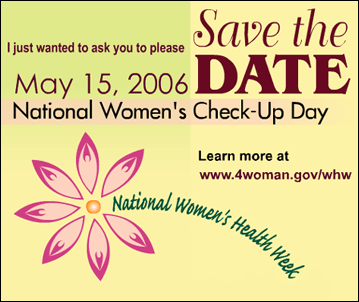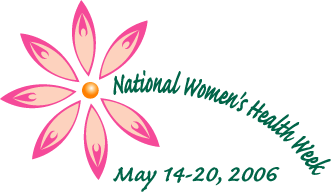|
|
What genetic disorders does prenatal genetic testing detect?
|
Hsien Hsien Lei at Genetics and Health asks ‘What genetic disorders does prenatal genetic testing detect?’ in her most recent genetics quiz.
The answer?
‘Down syndrome, trisomy 13, trisomy 18, sex chromosomal abnormalities, and other rare genetic disorders resulting in mental retardation and/or physical problems.’
See more of her genetics quizzes here!
________________________________________
If you like this post please share or vote for it below:
Stumble:  Kirtsy:
Kirtsy: ![]() delicious:
delicious:  reddit:
reddit:  Digg:
Digg: 
________________________________________
If you like my blog please subscribe to read updates in a
feed reader (what does this mean?)
or by email!
Thanks! I really appreciate all your support!
________________________________________
Related Posts:
|
|
Weight gain increases risk of breast cancer
|
A new study to be published in the journal Cancer by Heather Spencer Feigelson of the American Cancer Society has found that women who gain weight as an adult have a greater chance of getting breast cancer later on in life.
The study looked at data from over 44.000 women and concluded that the more weight a woman gained – the greater chance she had of developing any type of breast cancer. Women who gained more than 60 pounds were either twice or three times as likely to develop certain types of cancers compared to those who only gained 20 pounds.
It is believed that the link between the two in breast cancer is due to fat tissue producing more estrogen. In estrogen positive tumors, estrogen helps the cancer to grow. I don’t have a copy of the Cancer paper, but according to Staff Nurse weight gain only increased the chance of developing estrogen positive tumors, not estrogen negative – in accordance with previous data.
A connection between cancer and obesity has been known a long time – this really is no surprise. I would like to see data that shows the link between a percent of weight gain rather total pounds gained. For some women gaining 20 pounds is a lot, but for others – if they are otherwise large women – 60 pounds may not be that much of a gain. If I can get a copy of the study, I will see if they looked at percent weight increase or not.
(Technorati Tags: breast cancer, weight gain, health, cancer, fat, estrogen)
________________________________________
If you like this post please share or vote for it below:
Stumble:  Kirtsy:
Kirtsy: ![]() delicious:
delicious:  reddit:
reddit:  Digg:
Digg: 
________________________________________
If you like my blog please subscribe to read updates in a
feed reader (what does this mean?)
or by email!
Thanks! I really appreciate all your support!
________________________________________
Related Posts:
- More breast cancer news
- Stay fit to reduce risk of breast cancer
- Breast cancer – exercise, obesity and tamoxifen
May 15, 2006
|
|
The paradox of BRCA1 in breast cancer
|
Mutations in the gene BRCA1 are associated with about 5% of breast cancers. In the remainder of breast cancers there are still decreased levels of BRCA1 present. Due to this it is believed that the normal role of BRCA1 is to suppress tumors.
High levels of VEGF (Vascular Endothelial Growth Factor) in breast cancer patients is an indicator of the aggressiveness of the disease. This is because VEGF leads to angiogenesis. Angiogenesis is the process of growing new blood vessels. When tumors grow to a certain size the cells within it can’t get enough oxygen – a condition called: hypoxia. Hypoxia could otherwise cause a cell to die, but cancer cells find a way around this. They start releasing VEGF, resulting in new blood vessels coming to the tumor thus providing the needed oxygen and other nutrients.
Now bear with me – it gets a bit more complicated – for a cell to make more VEGF, it first needs more of the transcription factor called HIF-1 (Hypoxia Inducible Factor). When a cell is in a condition of no oxygen (hypoxia), HIF-1 is stabilized and plenty of it is available.
So this is what we have so far:
A cell is in a state of hypoxia (e.g. within a tumor), this results in an increase in HIF-1, which results in more VEGF, which results in an increase in angiogenesis – providing the cancerous cells the oxygen they need to stay alive.
Hypoxia —–> HIF-1 —–> VEGF —–> angiogenesis
So what does BRCA1 have to do with this? Recent research by Insoo Bae of Georgetown University now shows that BRCA1 helps to stabilize HIF-1. On one hand this data helps to explain why some earlier research found lower levels of VEGF in women with BRCA1 mutations. If the BRCA1 gene is mutated, its corresponding protein is likely to either not be present or to not function properly. If the BRCA1 protein is not present to help stabilize HIF-1, then less VEGF will be made.
However, it contradicts other data in which suggests that BRCA1 is a tumor suppressor since it shows that decreased levels of BRCA1 should result in less VEGF and therefore, less angiogenesis.
So what is the answer to this paradox? No one knows yet, but Insoo Bae’s group suggests that the decrease in BRCA1 in breast cancers may not be responsible for increase in angiogenesis in these cancers.
Stay tuned to this blog for more information about the role of BRCA1 in breast cancer in the coming weeks, months or however long it takes!
Insoo Bae’s paper about this research was published in the May 12, 2006 volume 281, Number 19 issue of the Journal of Biological Chemistry.
(Technorati Tags: BRCA1, VEGF, angiogenesis, hypoxia, breast cancer, HIF-1)
________________________________________
If you like this post please share or vote for it below:
Stumble:  Kirtsy:
Kirtsy: ![]() delicious:
delicious:  reddit:
reddit:  Digg:
Digg: 
________________________________________
If you like my blog please subscribe to read updates in a
feed reader (what does this mean?)
or by email!
Thanks! I really appreciate all your support!
________________________________________
Related Posts:
- Breast cancer research update – 7/20/07
- Breast cancer update – 7/12/07
- New breast cancer gene discovered
|
|
National Women’s Check-Up Day
|
Today, the second day of National Women’s Health Week, is: National Women’s Check-Up Day!

Around the country many hospitals and other health care centers will be providing preventive health screenings to women.
Just a bit of criticism here: according to the ‘The National Women’s Health Information Center‘ we are supposed to
‘contact their existing health care providers or one of the participating health care providers to schedule check-ups and screening services that day’. While it is of course good that the country is acknowledging the fact that many women need to be checked for many illnesses – it seems kind of silly to suggest we all do it today. I see my doctor every January – am I supposed to go again today? Of course not. Instead they should just emphasis an awareness of the importance of regular exams. It’s not like we could all get our appointment on the same day of the year anyway!
So if you do see a doctor on a regular basis and are up to date on any tests or screenings you need – sit back and relax (or more likely work) today! If you haven’t however – you really should stop and make and appointment with your doctor to keep yourself as healthy as possible.
________________________________________
If you like this post please share or vote for it below:
Stumble:  Kirtsy:
Kirtsy: ![]() delicious:
delicious:  reddit:
reddit:  Digg:
Digg: 
________________________________________
If you like my blog please subscribe to read updates in a
feed reader (what does this mean?)
or by email!
Thanks! I really appreciate all your support!
________________________________________
Related Posts:
- Happy Mother’s Day!
- American schools – no learning allowed!
- National Women’s Health Week Starts Today!
May 14, 2006
|
|
National Women’s Health Week Starts Today!
|

Today, Mother’s Day, is this year start of National Women’s Health Week! It runs from May 14-20 and is in its 7th year. It is organized by the Department of Health and Human Services and an alliance of other organizations. The purpose of the event is to ‘raise awareness about manageable steps women can take to improve their health’ and to ‘encourage women to take simple steps for a longer, healthier, and happier life’
Learn more about this event by visiting: ‘ The National Women’s Health Information Center‘ and find out how you can participate and spread the word! The site also has links for more information about women’s health, ecards to send, posters to print out and more!
________________________________________
If you like this post please share or vote for it below:
Stumble:  Kirtsy:
Kirtsy: ![]() delicious:
delicious:  reddit:
reddit:  Digg:
Digg: 
________________________________________
If you like my blog please subscribe to read updates in a
feed reader (what does this mean?)
or by email!
Thanks! I really appreciate all your support!
________________________________________
Related Posts:
- Happy Mother’s Day!
- National Women’s Health Week and WOMAN Challenge
- Exercise for your heart with WOMAN Challenge
« Previous Page — Next Page »




